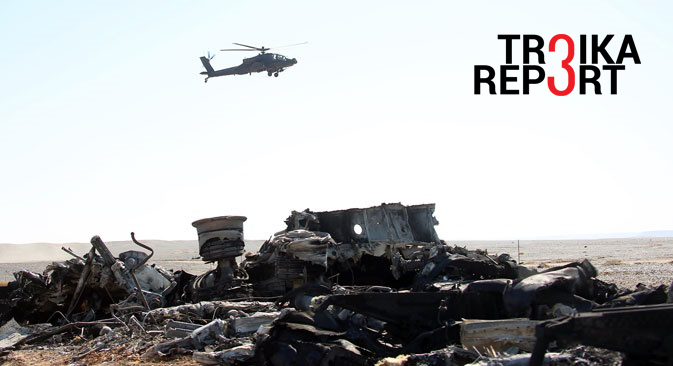
Wreckage of Russian Airbus A321 at the site of the crash in Sinai, Egypt.
AFP / East NewsWith suspicions growing that the Russian Metrojet airliner that crashed on Egypt’s Sinai Peninsula on Oct. 31 was brought down by Islamist terrorists, the telephone conversation this week between British Prime Minister David Cameron and Russian President Vladimir Putin has possibly cleared the roadblock in bilateral relations between London and Moscow for a joint effort to unearth the truth, although no formal commitment to cooperate was made public.
Still, British intelligence appears to be in possession of solid proof that a bomb was planted on the Russian airplane by an offshoot of ISIS in the Sinai Peninsula. The plot was allegedly masterminded by Abu Osama al-Masri, an Egyptian cleric who has sworn allegiance to the Islamists of the self-proclaimed Caliphate. What’s more, the British media, citing Whitehall officials, reported that Cameron’s cabinet would help Egypt or Russia in a “kill or capture” mission, and that SAS operatives could be deployed to Egypt for this purpose.
Moreover, the Russian government has requested the F.B.I. for assistance in carrying out the investigation, and the U.S. federal agency has agreed to render professional help.
All previous attempts by Russia to forge a united front of global powers to fight against terrorists in the Middle East have failed. A single coalition against ISIS has not emerged. Yet certain positive signals were sent in the aftermath of the tragedy over the Sinai, opening the way for some cooperation between Russia and the West, firstly, in order to investigate the air crash and, secondly, to cooperate on security issues. Does this mark a watershed?
Vladimir Sotnikov, director of the East-West Strategic Studies Center, a Moscow-based independent think tank, sounded rather optimistic in his comments to Troika Report:
“The tragedy shows that whenever there are breaches in providing security, and in this case it looks like there were breaches in providing security for foreign nationals vacationing in Egypt, the threat of terrorism will increase. It affects the interests of thousands of people. Not only Russians. The actions taken by many foreign governments in the wake of the air crash prove that they share this approach.”
“Moreover, this tragic event shows that we have one enemy in common. And it has to be dealt with irrespective of any other thorny issues, for instance, the differences we have with the U.S. administration and the UK government over the crisis in Ukraine.”
“Despite recent hawkish statements that Russia is the main security threat to the West, there is a gleam of hope that there will be cooperation between the Western powers and Russia.”
Sotnikov emphasized that the phone conversation between Cameron and Putin was largely symbolic since London and Moscow remain at odds over major regional conflicts and security issues.
The road to putting together a global response to a global challenge will be bumpy. This week The New York Times seems to have reprinted a stereotyped viewpoint dating back to the peak of the Cold War by claiming that there is “deepening belief in the Russian public, stoked by Mr. Putin’s propaganda machine, that Western governments are conspiring against the country’s interests.”
This assumption does not resonate with the continuous insistence by Moscow that Russia will not neither shut down nor shut up, and will not opt for self-isolation. Russia’s recent concerted diplomatic engagement bears witness to the seriousness of Moscow’s intentions. The West in general, and the U.S. and UK in particular, are viewed as partners in pursuing a common goal.
The first signs of potential interaction between Russia and the West in clarifying the particulars of the catastrophe in mid-air coincided with a symbolic statement by Al Qaeda leader Ayman al-Zawahiri: “The Americans, Russians, Iranians, Alawites, and Hezbollah are coordinating their war against us – are we not capable of stopping the fighting amongst ourselves so we can direct all our efforts against them?”
The Europeans are conspicuously missing from the blacklist but it is hardly conceivable that they have been exempted, given the centuries-old perception by Muslim fundamentalists of Europeans as crusaders from the West. This call for “terrorists incorporated” should not be taken lightly.
If the West and Russia fail to realize that they are in the same boat or the same airliner, targeted by a common enemy driven by a deep-seated hate, and if they fail to admit that internal squabbling weakens them in the face of adversity, then the chances of winning not just the battle but the war against global terrorism are pitifully slim.
The opinion of the writer may not necessarily reflect the position of RBTH or its staff.
All rights reserved by Rossiyskaya Gazeta.
Subscribe
to our newsletter!
Get the week's best stories straight to your inbox